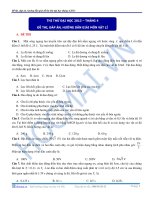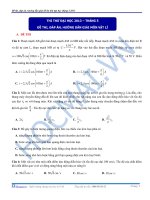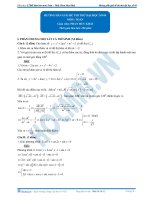Sách hướng dẫn tiếng anh A2 hệ đại học
Bạn đang xem bản rút gọn của tài liệu. Xem và tải ngay bản đầy đủ của tài liệu tại đây (204.71 KB, 10 trang )
<span class='text_page_counter'>(1)</span><div class='page_container' data-page=1>
<i>Unit 4: Are you sure you’ll be all right? </i>
<b>Dialogue Practice 3 </b>
Bây giờ bạn hãy hoàn thành các câu trong hội thoại này rồi thực hành nói.
1.
A: I'm going to be a racing driver.
B: (dangerous)...
A: (isn't / all right)...
B: (crash /get killed)...
A: (won't)...
B: (find a job)...
A: (will / good driver)...
B: (sure all right?)...
A: (course)...
2.
A: I'm going to be a doctor.
B: (have to study seven years)…...
A: (know / I don't mind)...
B: (not finish your
studies)…...
A: (will)...
B: (have a really hard
life)...
A:
(interesting)...
B: (have to work very long
hours)...
A: (know / don't
mind)...
B: OK. If that's what you want.
A:
(is)...
<b>4B. STRUCTURE </b>
</div>
<span class='text_page_counter'>(2)</span><div class='page_container' data-page=2>
<i>Unit 4: Are you sure you’ll be all right? </i>
<b> If - S - Verb (simple present), S - will - Verb (inf) </b>
Ví dụ:
If I need money, I'll find jobs.
Nếu tơi cần tiền, tơi sẽ tìm việc làm.
If you open that door, you'll see something strange.
Nếu bạn mở cửa ra, bạn sẽ thấy một điều kỳ lạ.
If it rains, we won't go out.
Nếu trời mưa chúng ta sẽ khơng đi ra ngồi.
If he comes, we won't go to the cinema.
Nếu hắn đến chúng ta sẽ không đi xem phim nữa.
<b>Structure Practice 1 </b>
Bây giờ bạn hãy viết các câu để trả lời câu hỏi:
How does the machine work?
Ví dụ: If you push lever B, you'll get an electric shock.
Bạn hãy viết như câu mẫu.
1. ...button A, ... a surprise.
2. ... lever B, ... an electric shock.
3. ... lever C, ... a hamburger.
4. ... handle D, ... a flower.
5. ... handle E, ... hear music.
6. ... button F, ... a hot drink.
<b>Structure Practice 2 </b>
Bây giờ bạn hãy đặt động từđúng dạng vào chỗ trống.
If you press
pull
push
button
lever
handle
A,
B,
C,
D,
E
</div>
<span class='text_page_counter'>(3)</span><div class='page_container' data-page=3>
<i>Unit 4: Are you sure you’ll be all right? </i>
1. If you ... that button, you ... a cup of coffee. (press, get)
2. If I ... time, I...and see you. (have, come)
3. If it ..., we ... the party inside. (rain, have)
4. I ... you if I ... help. (tell, need)
5. I hope you ...and see us if you ... in Chicago again. (come, be)
6. If you ... that door, you ... something strange. (open, see)
7. I …………...surprised if he ...before 7 o'clock. (be, arrive)
8. If you ... fast, we ... time to play tennis. (eat, have)
9. If you ……… up early tomorrow, I ... you to the swimming pool? (get, take)
10. I ... my car if I ... to live in London. (sell, go)
<b>Structure Practice 3 </b>
Bạn hãy dùng các tính từ trong bảng để hoàn thiện các câu sau.
fat dark hungry older thirsty
drunk tired wet cold
1. If you don't eat, you'll get ...
2. If you eat too much, you'll get ...
3. If you don't drink, you'll get ...
4. If you drink too much alcohol, you'll get ...
5. If you run a long way, you'll get ...
6. If you go out in the rain without an umbrella, you'll get ...
7. If you go out in the snow without a coat, you'll get ………….…………...
8. In the evening, when the sun goes down, it gets ...
9. We are all getting ...
<b>4C. LISTENING </b>
Trước hết bạn hãy đọc những trạng từ sau:
angrily coldly happily kindly loudly sleepily
Ở những bài trước chúng ta đã được biết các trạng từ thường được dùng làm rõ nghĩa cho
động từ. Nó thường được cấu tạo từ một tính từ bằng cách cộng thêm "ly" vào sau tính từ.
</div>
<span class='text_page_counter'>(4)</span><div class='page_container' data-page=4>
<i>Unit 4: Are you sure you’ll be all right? </i>
A. Bây giờ bạn hãy nghe đi nghe lại nhiều lần (Unit 4. Listening) rồi chọn một trong
những trạng từ trên cho mỗi câu.
1...
2...
3...
4...
5...
6...
B. Bạn hãy nghe tiếp 5 câu và hãy tìm thêm các trạng từ để diễn đạt thái độ của người
đang nói là như thế nào.
1... 4...
2... 5...
3...
<b>Note 1:</b> Các trạng từđược cấu tạo từ tính từ có nghĩa của tính từđó. Nó bổ nghĩa cho động
từ.
Ví dụ: He is a careful driver. He drives carefully.
<b>Listening Practice 1 </b>
Bây giờ bạn hãy điền vào chỗ trống dùng tính từ hay trạng từ.
Ví dụ: She is a quick worker. She works quickly.
1. I am very ...without you. (angry/ angrily)
2. She spoke to me ...(angry/ angrily)
3. I don't think your mother drinks very ... (good/ well)
4. You've got a ...face. (nice/ nicely)
5. I play guitar very ... (bad/ badly)
6. It's ...cold. (terrible/ terribly)
7. Your father's got a very ...voice. (loud/ loudly)
8. Why are you looking at me... (cold/ coldly)
9. You speak very...English. ( good/ well)
10. You speak English very ... (good/ well)
<b>Note 2:</b> Chúng ta cũng dùng trạng từđi với tính từ và các trạng từ khác.
Ví dụ: She sings very well.
</div>
<span class='text_page_counter'>(5)</span><div class='page_container' data-page=5>
<i>Unit 4: Are you sure you’ll be all right? </i>
That film last night was very funny.
adv adj
<b>Listening Practice 2 </b>
Bây giờ bạn hãy chọn 1 động từ + 1 trạng từở trong ô đểđiền đầy đủ câu:
1. I'm going to say something very important, so please ………….. to me ...
2. John! I need you help. ...!
3. I've met him but I don't ... him very ...
4. They ... At the end of the day they're always tired.
5. I'm tired this morning. I didn't ... last night.
6. You're a much better tennis player than me. When we play you always ...
7. ... before you answer the question.
8. Our teacher's isn't very good. He doesn't ... things very ...
9. Why ... you ...? I haven't done any thing.
10. Can you please ... that ...?
<b>4D. READING </b>
Trước hết bạn hãy đọc bài sau đây nhiều lần, cố gắng hiểu nội dung bài. Nếu từ nào chưa
rõ bạn hãy xem phần từ mới.
<b> THE GREENHOUSE EFFECT </b>
Scientists believe that something very serious is happening to the Earth. It is becoming
warmer. Scientists predict that there will be major changes in the climate during the next
century. Coastal water will have higher temperatures. This will have a serious effect on
agriculture. Farmers will have trouble producing good crops. In warm regions the weather will
be too dry. The amount of water could decrease by 50 percent. This would cause a large decrease
in agricultural production.
World temperatures could increase from 1.5 to 5.6 degrees Celsius by the middle of the
twenty-first century. And the increase in temperature could be even greater in the Arctic and
Antarctic regions. A rise in temperatures could cause the great ice sheets to melt, which, in turn
would raise the level of the oceans one to two meters. Many coastal cities would be underwater.
Why is the Earth becoming warmer?
The Earth and its atmosphere are kept warm by the sun. The atmosphere lets most of the
light from the sun pass through to warm the Earth. The Earth is warmed by the sunlight and
come explain listen repeat
sleep think win work are
</div>
<span class='text_page_counter'>(6)</span><div class='page_container' data-page=6>
<i>Unit 4: Are you sure you’ll be all right? </i>
sends heat energy back into the atmosphere. Much of this energy escapes from the Earth's
atmosphere. However, some of it remains. Gases such as carbon dioxide, ozone, and water vapor
absorb this energy and create more heat. Then this heat is sent back down to Earth, and the Earth
becomes warmer.
Scientists call this warming of the Earth and its atmosphere the "greenhouse effect". A
greenhouse is a special place where plants are grown. It is made of glass or plastic. The Sunlight
passes through the glass or plastic and warms the air inside. The heat inside escapes very slowly,
so the greenhouse remains very warm. This is exactly what is happening on Earth.
Another reason why the Earth is growing warmer is because of the amount of ozone in our
atmosphere. Ozone is also a gas, a form of oxygen. In the upper atmosphere, very far from the
Earth, a layer of ozone helps to protect the Earth from 95 percent of the harmful light that comes
from the sun. If your skin receives too much of this light, you could develop skin cancer. We
need the ozone layer to protect ourselves. But the ozone layer is in trouble. Scientists have
observed that the ozone layer is becoming thin, and above Antarctica there is a hole. This allows
too much of the Sun's dangerous light into our atmosphere and makes the Earth warmer.
Sau khi đọc kỹđoạn văn trên, bạn hãy trả lời các câu hỏi sau:
1. What is a greenhouse?
………...
2. What causes the greenhouse effect on Earth?
………...
3. Why do scientists call this the greenhouse effect?
………...
4. What gases in the atmosphere cause the Earth to become warmer?
………...
5. What does ozone layer protect people from?
………...
<b>Reading Practice 1 </b>
Bạn hãy chọn từ thích hợp cho mỗi câu.
absorb creates measure regions
carbon dioxide encourage occurring serious
coastal escapes ozone temperature
</div>
<span class='text_page_counter'>(7)</span><div class='page_container' data-page=7>
<i>Unit 4: Are you sure you’ll be all right? </i>
3. World ... could increase from 1.5 to 5.6 degrees Celsius by the middle
of the twenty-first century.
4. This could cause the great ice sheets to meet, raising the level of the oceans by one to
two meters. Many ... cities would be under water.
5. The Earth is warmed by the sunlight and sends heat energy back into the atmosphere.
Much of this energy ... from the Earth's atmosphere.
6. The destruction of rain forests that ... carbon dioxide also helps increase
the amount of carbon dioxide in our atmosphere.
7. Another reason why the Earth is growing warmer is because of the amount of
... in our atmosphere.
8. Scientists also ... people to learn about the changes that are ...
... in the world and how we can all help to protect our atmosphere.
<b>Reading Practice 2 </b>
Bạn hãy viết T (đúng) nếu câu đúng và F (sai) nếu câu sai. Bạn hãy viết NI nếu khơng có
đủ thông tin trong phần đọc để trả lời đúng hay sai.
1. Some scientists say that there will be major changes in the Earth's climate during the
next century.
2. At the equator, the weather will be very dry, and farmers have trouble growing crops.
3. Some scientists say that there is too much oxygen in the air.
4. When wood burns, it creates carbon dioxide.
5. Some plastic materials also affect the ozone layer and cause the Earth to become
warmer.
6. World temperatures could increase from 1.5 to 5.6 degrees Celsius by the middle of the
twenty first century.
7. Scientists observed a hole in the ozone layer above Antarctica.
<b>Reading Practice 3 </b>
Bạn hãy dùng will + một động từ trong bảng đểđiền vào mỗi câu.
have cause be have
be rise have be
1. Scientists predict that there ... major changes in the climate during the next
century.
2. Farmers ... trouble producing good crops.
3. In warm regions the weather ... too dry.
</div>
<span class='text_page_counter'>(8)</span><div class='page_container' data-page=8>
<i>Unit 4: Are you sure you’ll be all right? </i>
5. Coastal water ... higher temperatures.
6. Many coastal cities ... underwater.
7. This ... a serious effect on agriculture.
8. Which, in turn, ... the level of the oceans by one to two meters.
<b>Reading Practice 4 </b>
Bạn hãy điền giới từ thích hợp vào chỗ trống.
Something very serious is happening ………... (1) the Earth. It is becoming warmer.
This will have a serious effect ... (2) agriculture. ……... (3) warm regions the
weather will be very dry. The amount ………... (4) water could decrease by 50 percent. This
would cause a decrease …………... (5) agricultural production. World temperature could
increase from 1.5 …………... (6) 5.6 degrees Celsius ... (7) the middle
... (8) the twenty-first century. This could cause the great sheets …………...
(9) ice in the Arctic and Antarctic regions to melt and raise the level ……… (10) the
oceans ...……… (11) one …... (12) two meters. Many coastal cities would be
underwater.
<b>SUMMARY </b>
Tới lúc này bạn hãy đọc tất cả những nội dung ghi trong phần tóm tắt dưới đây. Nếu chưa
nắm vững phần nào bạn hãy đọc lại phần đó và làm các bài tập cho đến khi bạn đạt được các
mục đích của bài học.
1. Dùng động từ tương lai đơn Will + V(inf.) để diễn đạt hành động sẽ xảy ra trong tương
lai ở dạng khẳng định, phủđịnh và nghi vấn.
I'll go to work tomorrow.
Will you go to work tomorrow?
I won't go to work tomorrow.
2. Dùng will trong câu điều kiện có thực
If it rains, we won't go out.
3. Dùng trạng từ có tận cùng ly được cấu tạo từ tính từ.
Careful - carefully
Angry - angrily
Cold - coldly
He is a careful driver.
</div>
<span class='text_page_counter'>(9)</span><div class='page_container' data-page=9>
<i>Unit 4: Are you sure you’ll be all right? </i>
<b>SELF-TEST </b>
Sau khi học xong Unit 4 bạn hãy làm bài kiểm tra sau để xem mình đã nắm vững bài hay
chưa. Thời gian tối đa để hoàn thành bài tự kiểm tra này là 120 phút. Điểm số dành cho mỗi câu
hỏi được ghi trong ngoặc ởđầu câu. Nếu trả lời đúng tất cả bạn có thể chuyển sang học tiếp Unit
5.
Chú ý: Bạn cần tự trả lời tất cả các câu hỏi trước khi xem “Key to Self-test.”
<b>I. Complete these sentences using the following phrases. (20 points) </b>
don't drink go out in the rain don't sleep don't eat
cold the President dies there is a revolution
hot meet her again don't get a place at university
1. If you ... you'll get thin. 6. If I ... I'll be very happy.
2. If you ... you'll get tired. 7. If I ... I'll be unhappy.
3. If you ... you'll get thirsty. 8. If ... it will be very bad for the country.
4. If you ... you'll get wet. 9. If ... it will be very good for
them.
5. If it’s ... I'll warm myself. 10. If it’s ... I'll go swimming.
<b>II. Put the following adjectives into adverbs. (15 points) </b>
Example: bad → badly
1. quiet:………
2. nice: ………..
3. warm:………
4. great:……… …
</div>
<span class='text_page_counter'>(10)</span><div class='page_container' data-page=10>
<i>Unit 4: Are you sure you’ll be all right? </i>
14. happy:………..
15. comfortable:………..
<b>III. Chose the right word to put in the blanks. (10 points) </b>
1. She's very ... with me. (angry /angrily)
2. He doesn't think his mother drives very ... (good /well)
3. His father spoke to him ... (angry / angrily)
4. His sister has got a... face. (nice /nicely)
5. My brother plays the piano very ... (bad /badly)
6. It's ... dark. (terrible /terribly)
7. My house is small but ... (comfortable /comfortably)
8. She is looking at me ... (cold /coldly)
9. Our students speak ... French. (bad / badly)
10. They speak French ... (bad /badly)
<b>IV. Chose the suitable forms of the verbs to complete the sentences. (15 points) </b>
1. Can you help me? Sorry, not just now. I ………….. ... (work)
2. What does she do? I'm not sure. I think she ………... in a bank! (work)
3. We ... to Canada on holiday nearly every summer. (go)
4. But next summer we ………... to Scotland. (go)
5. I ... Matthew yesterday. He sends you his love. (see)
6. I ... three good films this week. (see)
7. She ... her boy friend for four weeks, and they're already talking about
getting married. (know)
8. ... you ever ... to change your job? (want)
9. If you ... help I ... what I can. (need / do)
10. Your horoscope says that this ... a difficult week for you. You
... a talk dark stranger. He ... all your money. (be/ meet / take)
<b>V. Use the following sets of words and phrases to write complete sentences. (10 </b>
<b>points) </b>
</div>
<!--links-->









